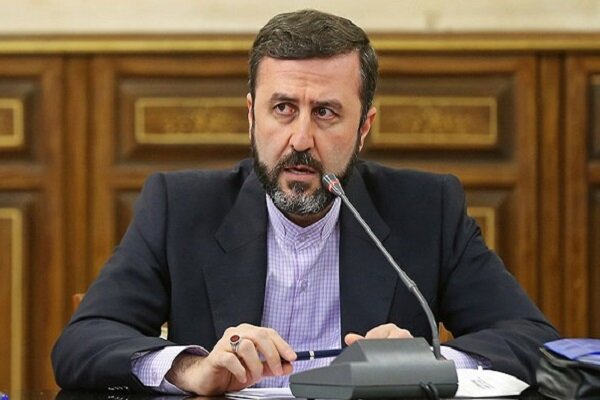In a letter to the United Nations High Commissioner for Human Rights Volker Türk, Kazem Gharibabadi highlighted: “The world suffers from fundamental challenges and dilemmas regarding human rights, mainly caused by the actions of countries that claim to be defending human rights and see themselves in the position of making demands from others and being immune from any criticism and responsibility. The responsibility of the international human rights mechanisms in such conditions is fundamental to support and promote human rights, which must be fulfilled by respecting independence, impartiality, professionalism, and non-selectivity. Adopting politically-motivated and selective approaches does a great disservice and is detrimental to human rights, and erodes public trust in human rights mechanisms.
He draw Commissioner’s attention to “some situations over the last six months in several countries regarding the right to freedom of assembly and of association” and noted: “France regularly witnesses massive public demonstrations in protest against the government’s policies. In some cases, up to two million people participated in the protests. Instead of listening to the protesters’ demands and trying to improve the situation, the French government resorts to large-scale violence to deal with the gatherings. Using anti-riot equipment, assaulting people, and arresting thousands of protesters are only part of the countermeasures adopted by the French government.”
“Having banned environmental rallies since 2019, Britain has introduced amendments to the Public Order Bill to increase police powers to deal with protesters at rallies. Referred to as the “repression bill”, the Public Order Bill, on the one hand, causes a significant and unprecedented increase in the powers of the police force to impose undue restrictions on peaceful protests; and on the other, it criminalizes assemblies under the pretext of deprivation of public comfort and provides a sentence of up to 10 years of imprisonment. This should also be noted that most recently, aroused by the systematic Islamophobia and anti-Islamism in the UK, a British racist set fire to a Muslim while leaving a mosque in Birmingham;” he added.
Gharibabdi also noted: “Following a sit-in protest in Germany, the German Minister of the Interior took to Twitter and said: “Blocking escape routes puts lives at risk. We saw that in a terrible way in Berlin. The police have my full support for a crackdown.” On the other hand, over 3,000 German police and security forces arrested hundreds of political opponents under the pretext of plotting to stage a coup d'état. Arresting these people – who only sought to bring changes in the German political system gun-free and without closing the street and killing the police – on suspicion of subversion and restricting any support for them on social networks is considered suppression of freedom of expression and opinion. In yet another move, the German government seeks to pass a law that will expel its opponents from all government jobs under the pretext of extremism.”
Referring to the recent riots in Iran, the Secretary General of Iran's High Council for Human Rights added: “Egged on by incitement and backing of particular States, media outlets and terrorist groups, the recent gatherings in the Islamic Republic of Iran deviated from their peaceful nature and morphed into riots, causing violations of the fundamental rights of citizens, including but not limited to the right to personal liberty and security, the right to freedom of movement as well as the right to health and safety. On the contrary, the Islamic Republic of Iran took a responsible policy and established an investigative committee to launch inquiries into the possible physical and financial damages and the violations of the rights of all parties. Nevertheless, in a politically-motivated move, the West and the United States exploited the Human Rights Council and held a special session to establish a so-called mechanism to investigate the recent riots in the Islamic Republic of Iran. Your Excellency also issued several one-sided letters and statements in this short period of time, and the spokesperson of your office also adopted several positions.”
“This is despite the fact that most European countries have been the scene of protests over the past months. Albeit demonstrations and protests in European countries were utterly peaceful, they were suppressed and dispersed with the most severe attacks by law enforcement forces. The same countries that consider themselves supporters of the rioters in Iran are – both in law and in practice – committing the most heinous crimes to systematically violate the right to peaceful assembly;” he added.
“I would like an answer to the following question: why didn’t the High Commissioner and his Office take a position regarding the deteriorating human rights situations in the aforementioned countries?! The Office of the High Commissioner for Human Rights is expected to perform its duties in a professional and non-selective manner. Public opinion is still awaiting an appropriate reaction;” Gharibabadi concluded.
AMK/PR
